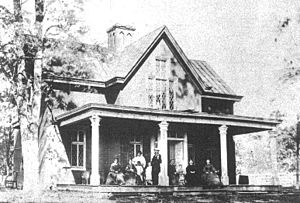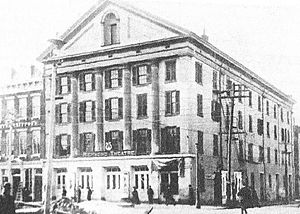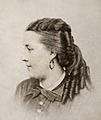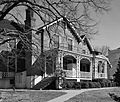John Wilkes Booth facts for kids
Quick facts for kids
John Wilkes Booth
|
|
|---|---|
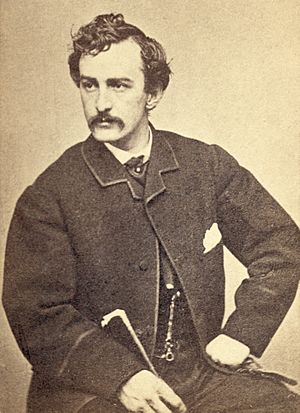
Booth c. 1865
|
|
| Born | May 10, 1838 Bel Air, Maryland, U.S.
|
| Died | April 26, 1865 (aged 26) |
| Cause of death | Gunshot wound |
| Resting place | Green Mount Cemetery, Baltimore, Maryland, U.S. |
| Other names | J.B. Wilkes |
| Occupation | Actor |
| Years active | 1855–1865 |
| Known for | Assassination of Abraham Lincoln |
| Political party | Know Nothing (with support of southern Democrats) |
| Family | Booth |
| Signature | |
John Wilkes Booth (May 10, 1838 – April 26, 1865) was an American actor. He is known for shooting and killing U.S. President Abraham Lincoln on April 14, 1865, in Washington, D.C. President Lincoln died the next morning.
Booth was born in Bel Air, Maryland. His parents were English immigrants. He was a very well-known stage actor. Booth supported the Confederacy during the American Civil War. He was angry with Lincoln for supporting voting rights for former slaves. Booth hoped to get the remaining Confederate troops to keep fighting the war, which was almost over. United States soldiers chased Booth and killed him at a farm in Virginia 12 days after the assassination.
Contents
Booth's Early Life and Family
Booth's father was Junius Brutus Booth, a famous British actor. His mother was Mary Ann Holmes. They moved to the United States from England in 1821. They bought a large farm near Bel Air, Maryland. John Wilkes Booth was born there on May 10, 1838. He was one of ten children. He was named after John Wilkes, an English politician who fought for people's rights.
In 1851, Booth's father built Tudor Hall on their Maryland farm. This was the family's summer home. They also had a winter home in Baltimore.
As a boy, Booth was athletic and popular. He was very good at riding horses and fencing. He went to the Bel Air Academy. His teachers thought he was smart but didn't try hard in school. He also attended the Quaker-run Milton Boarding School for Boys. Later, he went to St. Timothy's Hall, a military academy. Booth left school at age 14 after his father died.
While at the Milton Boarding School, Booth met a Romani fortune-teller. She told him he would have a grand but short life. She said he would die young and "meeting a bad end." His sister remembered that he wrote down this prediction. He often talked about it when he felt sad.
By age 16, Booth was very interested in theater and politics. He became part of the Know Nothing Party. This group wanted fewer immigrants to come to the United States. Booth wanted to be an actor like his father and his brothers, Edwin and Junius Brutus Jr.. He practiced speaking every day and studied Shakespeare.
Booth's Acting Career
Booth first acted on stage at age 17. This was on August 14, 1855, in Baltimore. He played a small role in the play Richard III. In 1857, he joined a theater group in Philadelphia. He used the name "J.B. Wilkes" so people wouldn't compare him to his famous family.
In 1858, Booth became a regular actor at the Richmond Theatre in Virginia. He became very popular with audiences. People liked his energetic performances. On October 5, 1858, he acted with his older brother Edwin in Hamlet.
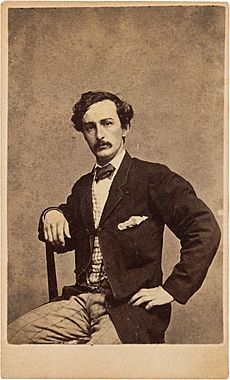
Some critics called Booth "the handsomest man in America." They said he was a "natural genius" and had an "astonishing memory." He was 5 feet 8 inches tall, with black hair. He was lean and athletic. His stage performances were often very physical. He would leap onto the stage and use big gestures. He was also an excellent swordsman.
Booth's Political Actions
Booth became involved in politics in the 1850s. He joined the Know-Nothing Party, which was against immigrants. Booth strongly supported slavery. In 1859, he joined a group in Virginia. This group helped capture John Brown after his raid on Harpers Ferry. John Brown was an abolitionist who tried to start a slave revolt.
During the Civil War, Booth worked as a secret agent for the Confederacy. He often met with Confederate Secret Service leaders in Montreal.
Plans Against President Lincoln
In the summer of 1864, Booth started planning to kidnap Abraham Lincoln. The idea was to take Lincoln south to Richmond. There, he would be held until he could be traded for Confederate prisoners of war. Booth found friends and people who supported the South to help him. Some people he tried to persuade refused and later helped the government in the trial.
On March 4, 1865, Booth attended Lincoln's second inauguration as President. Photos from that day show him there. On March 15, Booth and most of his helpers met to plan the kidnapping. Soon after, Booth heard that the President would go to a play on March 17. Booth decided this would be a good chance to kidnap Lincoln. He planned to stop Lincoln's carriage on the way to the play. But Lincoln changed his plans. He decided to speak to soldiers instead.
Booth's next plan was to kidnap the President at Ford's Theatre. Booth had friends there. But some of his helpers thought this plan would not work.
The Assassination of Lincoln
The Confederate capital of Richmond fell on April 4, 1865. General Lee's Confederate forces surrendered on April 9. After these events, Booth decided to kill Lincoln instead of kidnapping him. Booth may have made this decision after hearing Lincoln give a speech on April 11. In that speech, Lincoln suggested that Black people should have the right to vote.
On April 14, 1865, Booth was at Ford's Theatre in Washington, D.C.. He found out that Lincoln and his wife would be attending a play there that evening. Booth knew the play very well.
Booth met with his helpers. They planned to kill President Lincoln, Vice-President Johnson, and Secretary of State Seward. They also thought about killing General Grant. All these attacks were planned for around 10:15 that evening. That afternoon, Booth made a small hole to peek into the balcony room where the President would sit.
During the play, Booth quietly entered the unguarded balcony room. At 10:15 pm, Booth waited for a line in the play that he knew would make the audience laugh. Then, he fired a pistol very close to the back of Lincoln's head. Booth escaped by jumping from the balcony onto the stage. He shouted a triumphant line to the audience. He broke his leg during the jump. But he still escaped out the back door and got on his horse.
The badly wounded Lincoln was carried across the street to Petersen House. He died there the next morning. One of Booth's helpers did attack Secretary of State Seward with a knife that night. Seward survived the attack. The helper who planned to attack Vice-President Johnson did not follow through with his part of the plan.
Booth fled with a helper south through Maryland to Virginia. An army troop caught up with him on April 26. His helper surrendered, but Booth refused. During his capture, Sergeant Boston Corbett shot Booth. Booth died, even though the order was to capture him alive.
Booth's body was buried in his family's grave plot at Green Mount Cemetery in Baltimore.
Images for kids
-
Boston Museum playbill advertising Booth in Romeo and Juliet, May 3, 1864
-
Left to right: Booth with brothers Edwin and Junius, Jr. in Julius Caesar
-
The Historic Site marker on U.S. Route 301 near Port Royal, where the Garrett barn and farmhouse once stood in what is now the highway's median (2007)
See also
 In Spanish: John Wilkes Booth para niños
In Spanish: John Wilkes Booth para niños
 | Chris Smalls |
 | Fred Hampton |
 | Ralph Abernathy |


